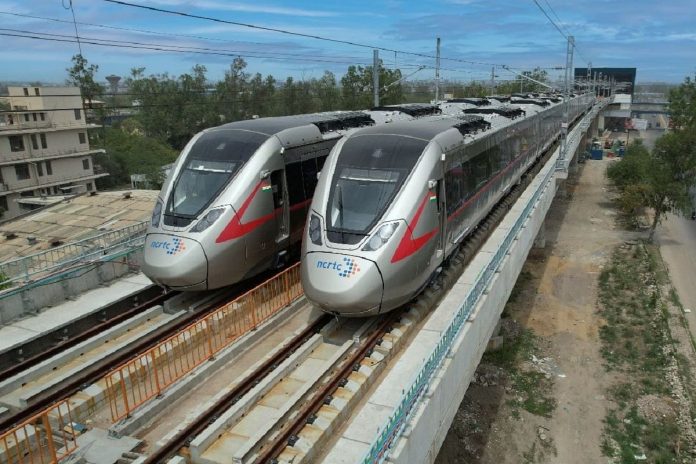The much-touted Delhi-Panipat and Delhi-Alwar Regional Rapid Transit System (RRTS) is likely to be delayed further.
This comes after the Centre refusing to approve these projects unless Arvind Kejriwal-led Delhi government signs Memorandum of Understanding (MoUs) with the Centre.
The signing of MoUs by the respective states is essential so that stakeholder government entities share liabilities such as payment of loans and sharing losses, if any, and provide all assistance for project execution.
“We have gone ahead with the Meerut corridor without Delhi government signing the MoU, but won’t do so in future project so that there is no obstacle in project execution,” writes Times of India, quoting an official from the Ministry of Housing and Urban Development.
Notably, the Centre went ahead with the construction of Delhi-Meerut RRTS corridor, despite the fact that the Delhi government did not sign the MoU for it.
The lack of MoU meant that the Delhi government kept dithering on fulfilling its financial commitment to the Delhi-Meerut RRTS project.
The Delhi government was required to contribute Rs 1,180 crore towards its share for the construction of the Delhi-Meerut RRTS corridor. Out of this, it had paid Rs 265 crore as the first instalment in March 2019 and Rs 500 crore in the second installment. A balance amount of Rs 415 crore was overdue, for which the Delhi government had thrown its hand up citing a paucity of funds.
It was only after an intervention from the Supreme Court, that the Delhi government agreed to contribute funds for the Delhi-Meerut RRTS project.
The 103-km-long Delhi-Panipat and 164-km Delhi- Gurugram-Shahjahanpur-Neemrana-Behror (SNB)- Alwar RRTS corridor are currently under consideration and yet to be approved by the the Public Investment Board.
While the Delhi-Panipat RRTS would cost at least Rs 21,600 crore, the Delhi-Alwar RRTS would cost around Rs 38,000 crore.
According to a written reply in Rajya Sabha on 13 March 2023, the Delhi government refused to provide financial support for the Delhi-Alwar and Delhi-Panipat RRTS Corridor.
The housing ministry told the Rajya Sabha that the Detailed project reports (DPRs) with approval and financial commitment of the Haryana government for the Delhi-Panipat and approval with financial commitment of Haryana and Rajasthan for Delhi-SNB RRTS corridors have been received.
“However, the Government of National Capital Territory of Delhi (GNCTD) has not agreed to provide financial support for Delhi-SNB and Delhi-Panipat RRTS corridors,” it said.
The RRTS — a brainchild of the National Capital Region Planning Board (NCRPB) — was first mooted in 2012 to de-congest the roads and bring down pollution in Delhi, while ensuring high-speed connectivity between the Capital and its satellite towns Panipat in Haryana, Meerut in Uttar Pradesh and Alwar in Rajasthan.
The project is jointly funded by multilateral institutions, and by the Centre and state governments, with the states contributing in proportion to infrastructure being developed in their territory.
For example, the Rs 31,632 crore Delhi-Meerut RRTS Corridor involves 20 per cent contribution by the Centre, while the states of Delhi and Uttar Pradesh are contributing 3.5 per cent and 16.5 per cent respectively.


